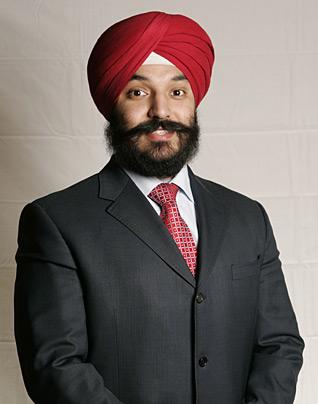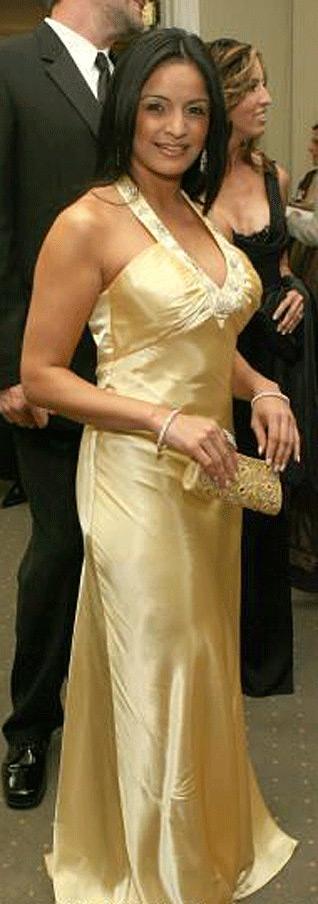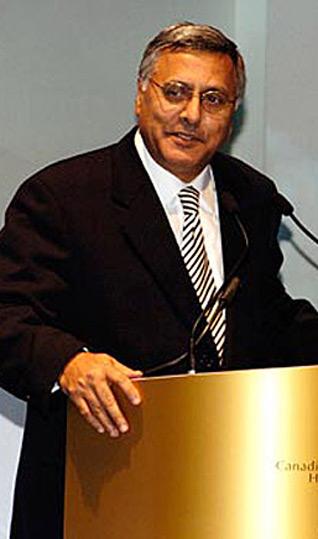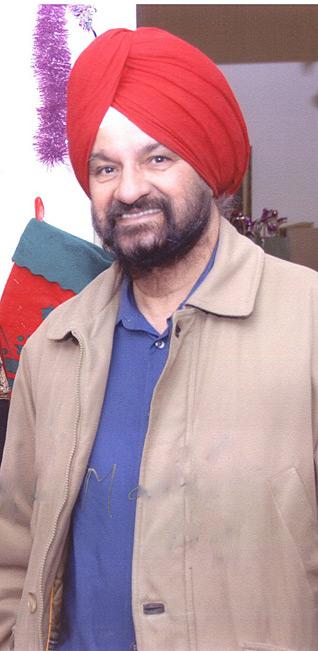History
Sikh-Canadians: Sophisticated in Democracy
by MARINA JIMINEZ
More than two dozen Canadians from the South-Asian sub-continent are running as candidates for next month's federal election in Canada, contesting ridings from Halifax to Vancouver, in some cases opposing one another - a phenomenal success story for this ethnic community.
Most are Sikhs, by far the most savvy campaigners and aggressive political organizers of any visible-minority group in Canada, and the only group with a greater number of MPs than their share of the population.
"Sikhs want to be in charge of power, or behind the power all the time. It is in their blood", Jagdish Singh Grewal, editor and publisher of Punjabi Post, one of 17 Punjabi newspapers in Brampton, Ontario, said with a chuckle. "They want to be MPs, MPPs or on city council. They feel respected and they get recognized in the community and the Punjabi media".
Nine Sikh-Canadian MPs were elected in 2006, compared with three Arab, four black and five Chinese - even though Chinese are the largest visible-minority group in Canada.
South Asians comprise 3.1 per cent of the population - but have 3.3 per cent of the 308 seats in the House of Commons, where Punjabi is now the fourth most common language, after English, French and Italian.
In the campaign for the October 14 election, Sikhs are running for each of the four parties: Liberals, Conservatives, New Democrats and the Greens. Including the likes of Tim Singh Uppal in Edmonton-Sherwood Park, Ujjal Singh Dosanjh in Vancouver South and Gurbax Singh Mahli, running for the fifth time in Bramalea-Gore-Malton.
Sikh-Canadians are running on both the Liberal and Conservative tickets in Newton-North Delta, Mississauga-Brampton South and Calgary Northeast.
Many factors account for the electoral success of Sikh-Canadians. They are relatively affluent, speak English, and come from the world's most populous democracy. A religious minority, they have a long history of political activism in their homeland. The sophisticated networks that form around gurdwaras (Sikh places of worship) make it easy to mobilize funds and supporters.
As well, there is a sense of collective ownership of campaigns. Sikhs' political consciousness comes in part from their public legal battle to win the right to wear articles of faith, such as the kirpan, and from their historic exclusion from Canada, some experts suggest.
Prime Minister Stephen Harper apologized last month for an incident in which the Komagata Maru, a ship filled with Sikhs, was barred entry off the British Columbia coast in 1914.
Many Sikh candidates live in Mississauga and Brampton, where they comprise well over 15 per cent and 19 per cent of the population, respectively. These newer suburban ridings in Greater Toronto offer newcomers more opportunities, as political ambitions and machines are not so entrenched as in older Toronto ridings, said Myer Siemiatycki, a professor at Ryerson University.
"The Sikhs are united and know they have to be politically active to defend their interests", he said. "The Black and Chinese communities are more internally diverse and divided".
Sikh-Canadians do not merely support candidates of their own background, but also play the role of kingmakers. A block of Sikh supporters helped to secure the Liberal nomination for Andrew Kania in Brampton West against two South Asian rivals. About one third of the riding's 170,000 residents are South Asian, and many are involved in Mr. Kania's campaign.
Mr. Kania, who was chair of John Manley's Liberal leadership bid, has courted Sikh supporters, attending their weddings and birthday parties, and getting to know them through the area's gurdwara, the largest in Canada.
Sikhs jokingly say they expect their MPs to earn their "MBBAs", which means attending marriages, births, bhogs (a Sikh religious ceremony) and anniversaries. Mr. Mahli, a permanent fixture at Sikh community events, even gives out special certificates of recognition at weddings.
Sikh-Canadians have traditionally been Liberal - but that is starting to change. Parm Singh Gill, a 34-year-old businessman, is running for the Tories in Brampton Springdale against incumbent Liberal Ruby Kaur Dhalla. She won by 7,802 votes in 2006, and Mr. Gill knows it will be a tough race. However, he says he is getting a lot of support on Punjabi-language radio and television call-in programs.
"The Liberals cannot take the Sikhs for granted", Mr. Gill said. "Sikhs' social values are closer to the Conservatives'. They also have concerns about the immigration backlog, and getting applications processed faster".
Immigration is often the most significant issue for Sikhs, many of whom are trying to obtain Canadian visas for visiting family members and relatives from the Canadian missions in New Delhi and Chandigarh. They are also concerned about recognition of foreign work credentials. The Conservatives' immigration reforms, which give the minister discretionary power to screen applicants, are not popular.
In Surrey, British Columbia, some candidates have put up election signs in Punjabi, while at least two provincial MLAs (who are non-Sikhs) are studying the language at Simon Fraser University.
"People appreciate this", said Gurvinder Singh Dhaliwal, news director for a call-in show on Sher-E-Punjab AM 1550 radio in Vancouver with 300,000 listeners. He believes there is a lot of support for the NDP and the Liberals, and says pensions for foreign-born seniors is one of the most important issues for Sikh voters.
[Courtesy: The Globe & Mail]
September 25, 2008
Conversation about this article
1: Zorawar Singh (Richmond Hill, New York, U.S.A.), September 28, 2008, 9:48 PM.
This is amazing. Sikhs creating a new Punjab wherever they go.
2: T. Sher Singh (Guelph, Ontario, Canada), September 29, 2008, 8:48 AM.
The following was submitted to the Globe & Mail as a Letter to the Editor, in response to the above-noted article: In her article, Ms Marina Jiminez makes a reference to Sikh-Canadians as "the only group with a greater number of MPs than their share of the population." This may or may not be true. But I am quite sure I have never seen anyone in your journal or elsewhere refer to other ethnic communities in Canada, such as the English, Scots, Jews, Irish, etc., as being represented by MPs in a far greater number than their share of the population. Which is actually true. I suggest Ms Jiminez' reference to Sikh-Canadians thus betrays an askewed mindset which goes against the very spirit of Canada today and that of a democracy, and its appearance on the pages of an esteemed journal such as yours, in such a one-sided manner, is neither appropriate nor healthy for the wonderful country and society in which we are all so fortunate to live.
3: Suzy Kaur (Oxford, England), September 29, 2008, 10:25 AM.
I have mixed feelings about this. On the one hand it's good to see politicians like Navdeep Singh standing up against the reactionary views of some Sikhs who thought he must dance to their tune when the issue of gay marriage arose. It's good to see that level of sophistication and progressive attitude in a Sikh politiican. On the other hand, it seems to me that one problem with multiculturalism is that whilst it concerns itself with minorities, it neglects micro-minorities, that is, oppressed minorities within a minority. We can congratulate ourselves on the success of electing these MPs, but when the community is in denial about issues of women's rights, for example, the 'community networks' can act as a muffler and strangler of those who try to highlight certain issues. Sikh politicians need to do more to address the very real problems Sikh women face today.
4: Chintan Singh (San Jose, U.S.A.), September 29, 2008, 1:24 PM.
Two points that impressed me in this piece: firstly, in some situations Sikhs are runnning against Sikhs. I hope that we are competing against one another in a healthy and well intentioned manner and we do not take our political rivalries outside of political settings and our community does not get further divided because we are running against each other for political offices. Secondly, the point made by: "The Sikhs are united and know they have to be politically active to defend their interests ..." I believe this is what our Gurus taught that we take things and responsibility in our own hands and be self responsible and accountable for the needed change instead of complaining. I am glad to see that one of the reasons why Sikh-Canadians are active politicians is to protect, defend and lobby rights to wear articles of faiths for themselves and their fellow community members. I hope we can do something like this in France and the U.S. as well
5: Mohkam Singh (Paris, France), September 29, 2008, 1:49 PM.
The fact that Sikhs are running against each other in the same ridings is the strength, not a weakness, of the Sikh-Canadian community. Just think about it ... if all candidates, representing all significant parties, are Sikhs, then the winner will be ... yes, a Sikh! I believe this is how Sikh-Canadians broke the mould and are now making further inroads. This is the model all other communities in the diaspora should follow. Merely because Sikhs run against each other politically or represent the full gamut of the party system, doesn't make them anti-community, for heaven's sake. We are not a monolithic community ... and thank God for it. We've been taught to think for ourselves!
6: Harpreet Singh (London, England), September 30, 2008, 4:59 AM.
There is a danger of ghettoization. If Sikh MPs only exist to represent 'Sikh issues', whatever that means, how can they act as good politicians for Canadians of every race or religion? Surely MPs and politicians have a responsibility to everyone, not just to be figureheads or representatives of just one community. This mindset is selfish and divisive. I'm sure that these Sikh MPs don't just act for Sikhs alone. We should see beyond their religion and embrace true multicultural ideas, not separatism. [Editor: Many of these Sikh-Canadian politicians have been exemplary in representing the interests of all citizens. No wonder, a number of them have served as senior cabinet ministers in many governments, both federal and provincial. One of them became Premier of a province! At least two of them even considered throwing in their 'hats' for Prime Ministership of the country ... and would've been serious candidates if they had. And many of them continue to command incredible respect from the general population, even after years in parliament. Not a small feat for any politician.]
7: Harjinder Singh (India), September 30, 2008, 11:06 PM.
I might sound rude though, if politicians from India and Punjab come to canvass in Candaian elections, you dont need enemies if you have friends like them. Elections here are won by money, muscle and drug power. For proof, just follow any election scene in this country. Even elections to SGPC are not spared from this curse. I don't think our politicians can contribute in any positive way, other than narrow-mindedness and caste-based dirty politics. God save Sikh-Canadians!






